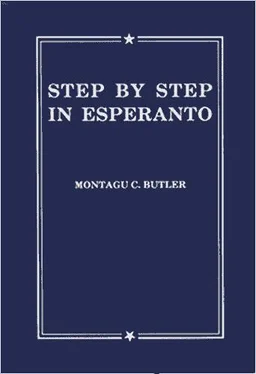Unuope, one at a time, singly. Duope, two together, two at a time. Ili atakis min triope, three together, in a bunch of three. Triopaatako, a three-together attack. Kiomope? How many at a time? or, together? Triopo, triopaĵo, a triad, triplet, bunch of three. Sesopigi, to form into groups of six. Ope, collectively, coupled, in groups.
1044. PO, OP. Compare: Duope ili supreniris la ŝtuparon, po du ŝtupoj ĉiupaŝe; Two abreast they went up the stairs, two steps at a time.
1045. Portu ĝin duope. Akiro kaj perdo rajdas duope. Vi du kaj mi iros triope. La soldatoj marŝis kvarope. Ĉu sidi ĉe tablo dek-triope portas malbonan sorton? Ariĝu dudekope. Larmoj unuopaj. Unuopulo. Fadeno triopigita ne baldaŭ disŝiriĝos.
1046. The conjunction antaŭ ol(rarely: antaŭ kiam) = before, ere (of time). Antaŭ ol li foriris, before he departed. Mi kantos(a) antaŭ la reĝo— Before (in-front-of) the king; (b) antaŭ ol la reĝo (kantis), before the king did .
1047. Antaŭ ol ili geedziĝis, ŝi estis lia tajpistino. Sed tiu, kiu diktas nun, estas ŝi!
“ Oksigenononi eltrovis antaŭ nur cent jaroj. Sen oksigeno neniu povas vivi.” “Nu, kiel oni vivis, antaŭ ol ĝi eltroviĝis?”
Avizo sur ŝipo: “La seĝoj en la salono estas por la sinjorinoj. La sinjoroj ne uzu ilin, antaŭ ol la sinjorinoj sidiĝos.”
Scienca demando. Patro: “Kial vaporo elvenas el bolilo, kiam bolas la akvo?” Filo: “Por ke Panjo povu malfermi viajn leterojn, antaŭ ol vi ilin vidos.”
La Manĉestra Ŝip kanaloestas tre grava. Antaŭ ol ĝi estis konstruita, oni devis mal ŝarĝi( unload ) la ŝipojn en Liverpolo, kaj sendi ilin al Manĉestro vagonare.
El eseo. Per malrapida manĝado la nutraĵo estas digestita, antaŭ ol oni englutas ĝin: tiumaniere ĝi riĉigas la sangon, kiu iras malsupren laŭ unu kruro kaj supren laŭ la alia.
“Ĉu Tommy sukcesis ĉe la ekzameno pri historio?” “Bedaŭrinde, ne. Sed la kara knabo ne estas kulpa pri tio: oni demandis al li pri aferoj, kiuj okazis longe antaŭ ol li naskiĝis.”
«Anstataŭ» («antaŭ ol», «krom», «por») … «‑i»
1048. Anstataŭ kanti, instead of singing.
Antaŭ ol kanti, before singing.
Krom kanti, except (in addition to) singing.
Por kanti, in order to sing (505).
Do not use other prepositions before ‑i.
1049. “Kial vi manĝas tiel rapide?” “Mi deziras manĝi kiel eble plej multe, antaŭ ol perdi mian apetiton.”
En koncerto. Oni diras, ke cigno( swan ) kantas, antaŭ ol morti, Estus bone, se iuj mortus, antaŭ ol kanti.”
Patrino: “Kial vi batis vian fratineton?” Filo: “Ni ludis Adam kaj Eva: sed anstataŭ tenti min, ŝi mem manĝis la pomon.”
“Ne rapidu! Vi devas marŝi ankoraŭ sep mejlojn.” “Mi tion scias. Ĝuste pro tio mi rapidas: mi deziras atingi la lokon, antaŭ ol laciĝi.
“Kiai vi ne lavis la vizaĝon, antaŭ ol veni al la lernejo? Oni facile vidas, ke vi manĝis ovon hodiaŭ matene.” “Ne, sinjoro. Mi manĝis tiun ovon hieraŭ matene.”
Komitato: Aro da gravaj personoj, kiuj unuope povas nenion fari, sed kune povas decidi, ke oni povas nenion fari, krom lasi la aferon al la sekretario por konvena agado.
1050. (a) Finu la laboron antaŭ ol ripozi. Kion vi faras krom manĝi kaj trinki? Ni legu por lerni, ne nur por nin amuzi. Anstataŭ helpi, li malhelpas. Ni penas vivi longe, anstataŭ peni vivi bone. Rigardu, antaŭ ol salti. [106]Surmetu palton antaŭ ol eliri.
(b) In order to see. Before speaking. Instead of coming. He came to help me. Instead of working he chattered. He did nothing but play. He stood up to go away. Before going away, he said “Good-bye”. In addition to going away, he stole my jewels.
1051. I will help you instead of your brother. Mi helpos vin(i) anstataŭ via frato,(ii) anstataŭ (helpi) vian fraton.
This distinction is not always observed, but the accusative should be used when (as here) its use removes ambiguity.
1052. Sometimes poris omitted, especially after iras.E.g., li iras vidiinstead of li iras por vidi.The full form is recommended.
1053. Do not use porif it is not required by the sense. Thus: mi volas iri,not mi volas por iri.
1054. Is there anything to eat? may be translated Ĉu estas io por manĝi?If this, though international, is thought to be illogical, alternative forms are available: io por manĝo; io manĝebla; io manĝinda; ia manĝaĵo;or io, kion manĝi. Easy to sing, facile kantebla. There is no one to help me, Ne estas iu, kiu helpus al mi.
Indirect (Reported) Form of Speech
1055. If something said (or written) is repeated word for word, this is “direct” quotation, and quotation marks are used.
Li diris
(a) “Mi iris”.
(b) “Mi iras”.
(c) “Mi iros”.
He said
(a) “I went”.
(b) “I am going”.
(c) “I shall go”.
1056. (a) If a quotation is introduced by the word ke( that ), it is said to be “indirect” (or, “reported”). If the ke( that ) is preceded by a verb in the past tense ( ‑is), English alters the tense of the following verb, but Esperanto repeats unchanged the form originally used. [107]
Li diris, ke
(a) li iris.
(b) li iras.
(c) li iros.
He said that
(a) he had gone.
(b) he was going.
(c) he would go.
| Direct |
Indirect |
| Mi pensis “li venis”. |
Mi pensis, ke li venis. |
| I thought “he came”. |
I thought (that) he had come. |
| Mi pensis “li venas”. |
Mi pensis, ke li venas. |
| I thought “he is coming”. |
I thought (that) he was coming. |
| Mi pensis “li venos”. |
Mi pensis, ke li venos. |
| I thought “he will come”. |
I thought (that) he would come. |
| Direct |
Indirect |
Mi raportis, ke ni estis (estas, estos) tie, I reported that we had been ( were , should be ) there . What I actually said was “Ni estis (estas, estos)”.Mi demandis, ĉu li estas preta. Ŝi demandis, kien ni iros. Mi skribis, ke mi venos baldaŭ. Li diris, ke li kantis jam tri fojojn.
1057. This applies not only to words actually used, but also to a thought or perception in the mind at the moment in question.
Читать дальше












